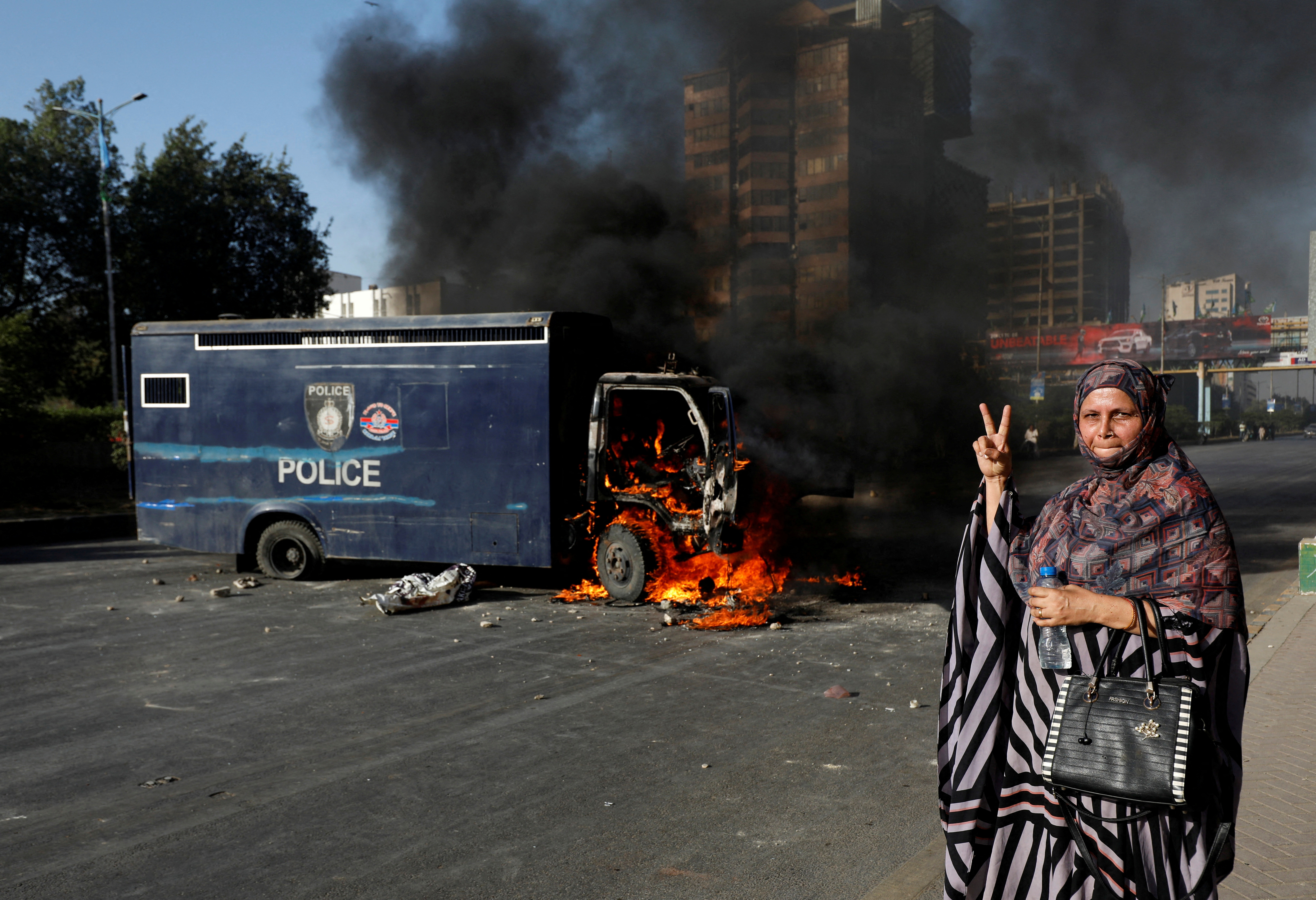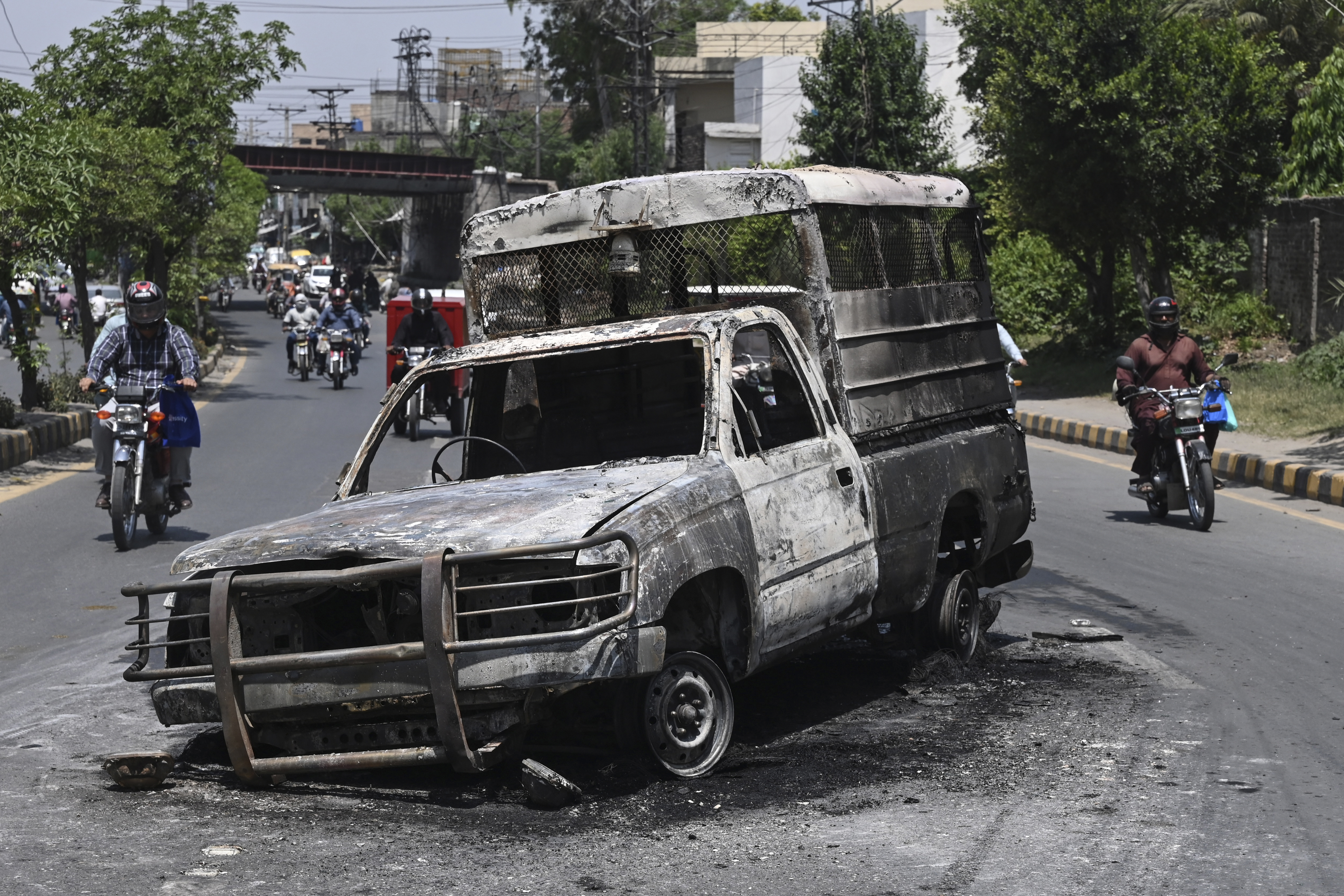
Mohammed Faisal, a food delivery driver in Karachi, has lost 6,000 rupees ($20) over the past three days.
The 26-year-old relies on WhatsApp messaging service to receive and track the locations of his food orders.
He uses his trusty motorbike and a smartphone with mobile broadband internet to traverse the main roads, narrow streets, and densely populated neighbourhoods in Pakistan’s largest and most-populous city.
Since the arrest of former Pakistan Prime Minister Imran Khan three days ago, mobile internet services remain suspended across the country.
Khan was ordered to be released on Thursday, after the country’s top court termed his arrest illegal. However, the mobile broadband shutdown was not lifted.

In a metropolis where street names and house numbers are rarely used for navigation, Faisal’s work has come to a near halt without access to the internet when he is out on the road.
“I can’t get orders because mobile data isn’t working,” he told Al Jazeera, adding that he incurs fuel wastage while trying to locate addresses without navigation apps.
Security forces have blocked several roads and intersections in major cities in an attempt to deter protesters.
“Roadblocks and data outage have ruined my livelihood,” Faisal said.
When you shut down internet and mobile access you actually hurt Pakistan’s economy, individuals and companies who use these services to earn their bread and butter. #internet #shutdown
— jehan_ara (@jehan_ara) May 11, 2023
Information blackout
Nearly 125 million people have been affected by the government’s decision to suspend mobile broadband and block access to social media apps.
Mohammad Fayyaz, who lives in a village in the eastern province of Punjab, feels cut off from the rest of the country during a time of major political upheaval.
“We use YouTube to watch the news, but with most social media apps being restricted since Tuesday, we feel disconnected from the events taking place in Islamabad or Lahore,” he told Al Jazeera from his village, Maanga, 255km (158 miles) east of the capital where Khan was taken away by paramilitary forces on Tuesday.
The authorities must ensure that access to information is not restricted. PPF urges the PTA to reverse its decision and immediately lift the ban on mobile internet services.
Read: https://t.co/BRtekd875D
— Pakistan Press Foundation (@Pakistan_Press) May 10, 2023
A spokesperson of the Pakistan Telecommunication Authority (PTA) told Al Jazeera that it received an order from the interior ministry to suspend mobile broadband service as protests broke out following Khan’s arrest.
⚠️ Confirmed: Live metrics show that Twitter, Facebook and YouTube are now restricted across #Pakistan amid the arrest of former PM Imran Khan; the incident is likely to limit freedom of assembly and the public's ability to seek information 📉
📰 Report: https://t.co/BCs5hPpTsU pic.twitter.com/CLIjGLQFLO
— NetBlocks (@netblocks) May 9, 2023
While mobile users have reported difficulty in using social apps including YouTube, Facebook, Twitter and Instagram, PTA spokesperson Malahat Obaid denied that the apps were blocked by the telecom authority.
“These apps are still working, but on throttle, so you can’t say they are blocked,” she said, referring to a practice used by internet providers to restrict internet speed without informing users.
A report by Open Observatory, a global open data resource that monitors internet censorship, shows that YouTube, Facebook and Twitter were restricted by service providers on Tuesday evening, while users were unable to access Instagram after Wednesday morning.
Global condemnation
The shutdown has been criticised by rights organisations, who have called on the Pakistani government to lift the restrictions.
🇵🇰Pakistan: Amnesty International strongly urges Pakistani authorities to exercise restraint and use minimum force without resorting to the use of firearms to disperse protestors. The ‘indefinite’ ban on mobile internet must be immediately lifted. https://t.co/DWf0aWLOUd
— Amnesty International South Asia, Regional Office (@amnestysasia) May 11, 2023
The United Nations High Commissioner for Human Rights Volker Turk said “freedom of expression, peaceful assembly and rule of law are key to resolving political conflicts”.
#Pakistan: @Volker_Turk urges restraint by security forces. Internet restrictions must be lifted. Freedom of expression, peaceful assembly & rule of law are key to resolving political conflicts – with no place for disproportionate force. Protesters should refrain from violence. pic.twitter.com/oXHPMPQvQg
— UN Human Rights (@UNHumanRights) May 11, 2023
Human Rights Watch termed it a “sweeping measure”, which it said denies ordinary people “access to lifesaving information, interferes with access to health care, and restricts the ability of journalists to upload photos and videos documenting government overreach and abuse”.
Pakistan’s police have fired on and used excessive force against protesters following the arrest of former Prime Minister Imran Khan.
The Pakistani government should uphold the right to peaceful protest while responding to violence with minimum force.https://t.co/qVB213kbBd pic.twitter.com/YNDPOmNxlb
— Human Rights Watch (@hrw) May 11, 2023
Sharp rise in VPN usage
Mobile users in Pakistan are no strangers to restrictions on internet services and apps. In 2013, YouTube was banned after the video streaming service’s hosting of an anti-Islam film led to countrywide protests. The ban was lifted after three years, but the authorities have imposed unannounced shutdowns in the wake of major protests in the past few years.
VPN provider, Hoxx VPN, has announced that it will be offering a free premium VPN service in Pakistan due to recent situation in the country. pic.twitter.com/jr2AIDE5Gb
— Startup Pakistan (@PakStartup) May 11, 2023
As soon as Tuesday’s shutdown was reported, Twitter users took to the platform to share novel ways to evade the ban and exchange notes on the most useful VPN services.
“The day [Tuesday] finished with VPN demand being 1,329 percent higher than the 28-day average prior to the social media blocks,” Simon Migliano of Top10VPN, a website that reviews and rates VPN services, told Al Jazeera.
Hit to frail economy
In addition to causing an information blackout and restricting communication, the shutdown has also hit various business sectors across the cash-strapped country, as it awaits help from the International Monetary Fund in the form of a $1bn bailout.
“As a technology-driven logistics company, we have seen our sales volumes drop drastically – down by 36 percent – since May 9,” said Hassan Khan, the CEO of Trax, which claims to have the third largest e-commerce fulfillment share in Pakistan.
Reports in Pakistani media said the telecommunication sector had suffered a loss of $2.85m since Tuesday, while the government had lost nearly $1m in tax revenue.
P@sha, an association representing Pakistan’s IT sector, said the sector is set to lose at least $3m a day until the restrictions are lifted.
Pakistan's #IT industry is facing a massive setback due to ongoing internet blockages. The industry is losing a significant amount of money, estimated to be around USD 3-4 million per day. #OpenPK4Business pic.twitter.com/1HPAwvYmRa
— P@SHA (@PASHAORG) May 11, 2023
On Thursday, a group of venture capital firms focused on startups and digital economy issued a statement saying that the restrictions and mobile broadband suspension will “add to negative investor perceptions” and that immediate action is needed from the Pakistan government to lift the restrictions.
According to Nighat Dad, a Pakistani lawyer and digital rights activist, the shutdown of mobile broadband and social media services violates the Constitution of Pakistan.
“The ban violates Article 19 A of the Constitution and [people’s] freedom of expression, which is enshrined in the Constitution,” she said, urging the government to make a decision “with proportionality, mention its legitimate aim and be very transparent around these shutdowns”.
However, the telecommunication authority that imposed the blanket mobile broadband suspension did not indicate when the country’s 125 million mobile broadband users will be able to use the service again.
“We cannot confirm when the suspension will be lifted, as we act upon the interior ministry’s orders,” PTA’s Obaid said.
Additional reporting by Alia Chughtai.







